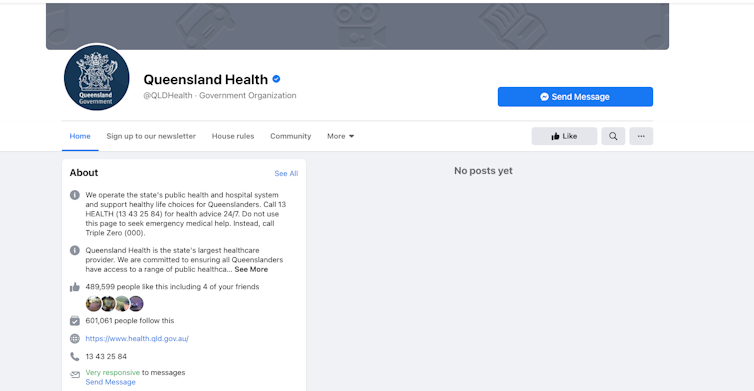Banning news links just days before Australia's COVID vaccine rollout? Facebook, that’s just dangerous
- Written by Maryke Steffens, Research Affiliate, University of Sydney; Research Fellow, National Centre for Immunisation Research and Surveillance; PhD Candidate, Macquarie University, University of Sydney
Facebook’s decision to ban media organisations from posting links to news articles on the social media giant’s platform comes less than a week before Australia’s COVID-19 vaccine rollout begins. The ban also prevented many health organisations, government health departments and other organisations from posting links (some, but not all, have now been restored).
The combined effect of this could be incredibly damaging.
My research is on how poor-quality information and misinformation in online environments, including social media, is presenting serious challenges for public health.
When I saw the news about Facebook’s ban this morning, I was struck by the terrible timing. Now, more than ever we need credible, evidence-based information about COVID-19 vaccines circulating on social media.
A balance to less credible information
Of course, not all media reporting is perfect. But research by myself and others has shown the media in general plays an important role as gatekeepers and disseminators of high-quality public health information to the public.
You can be critical of individual news organisations or reports while also recognising that much of the media has provided a crucial counterbalance to less credible information and misinformation on social media about vaccines.
We are now at risk of an imbalance in the types of COVID-19 vaccine information available on social media, just when the public needs reassurance and evidence-based answers to their often quite reasonable questions.
Read more: How to deal with the Craig Kelly in your life: a guide to tackling coronavirus contrarians
Public health organisations and government sites caught up in the ban
The fact that public health organisations and health departments were or are caught up in this — and are or were also reportedly unable to post links to their Facebook pages — is particularly worrying.
Facebook has said government pages should not be affected — but some have been. Some have now been restored and Facebook said it will reverse the ban on any pages accidentally affected.
Public health organisations — including government departments, research institutes, charities and not-for-profits — do so much in the vaccine information and hesitancy space.
Many people understandably have genuine questions and concerns about COVID-19 vaccines. People are really hungry for information right now. One of the main ways people get it is through social media.
Public health organisations support people with concerns on social media by digesting complex information, translating it for non-scientists, and answering questions.
And that’s why this timing is incredibly poor.
Facebook has traditionally been the place where a lot of vaccine misinformation has been spread. The social media giant does appear to be making an effort to fight misinformation. It recently did a purge and made it harder for posts by groups spreading vaccine misinformation to appear in people’s newsfeeds. Facebook has also pledged to fight misinformation about COVID-19 vaccines.
But banning links from media and public health organisations, just as we prepare to begin a national vaccine rollout, certainly won’t help that effort.
 Screenshot of the Queensland Health Facebook page at 11:30am. It has now been restored.
Facebook
Screenshot of the Queensland Health Facebook page at 11:30am. It has now been restored.
Facebook
Positive vaccination messaging will suffer
Many media organisations are likely planning a lot of coverage to go with the COVID-19 vaccine rollout.
In general, I have been impressed with the efforts of many media organisations to inform people about the science that underpins the new COVID-19 vaccines and debunk vaccine myths and misinformation.
They have been doing a lot of the heavy lifting and complementing the work of public health organisations, many of which lack the budget to do that kind of health messaging on their own.
By minimising the media’s role at this moment, Facebook will make it harder for people to access good information, at a time when they need it most.
We are living through a significant public health event. Facebook has a moral responsibility to support public health messages being put out by experts and today’s decision doesn’t help achieve that.
Read more: Australia must vaccinate 200,000 adults a day to meet October target: new modelling
Authors: Maryke Steffens, Research Affiliate, University of Sydney; Research Fellow, National Centre for Immunisation Research and Surveillance; PhD Candidate, Macquarie University, University of Sydney





